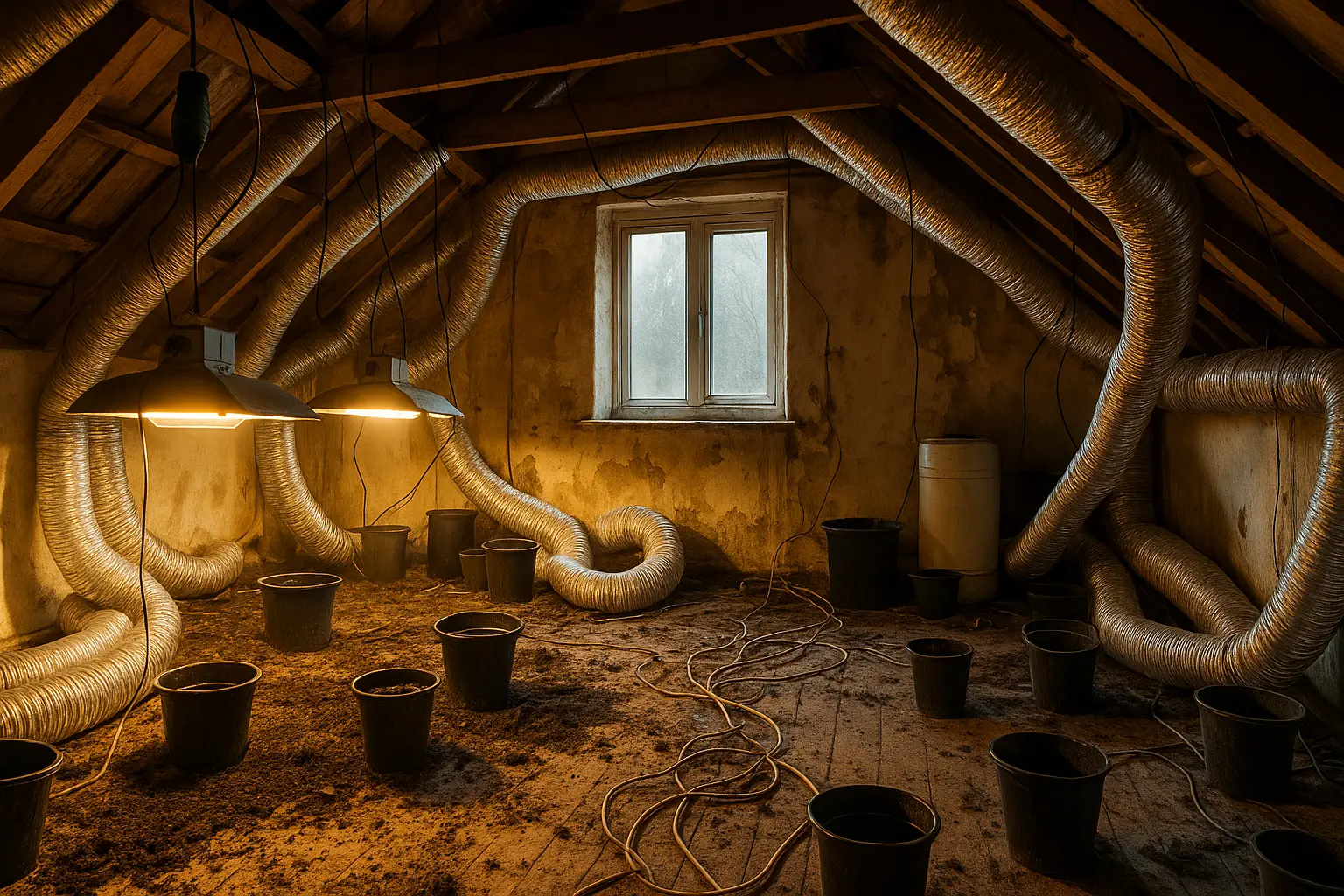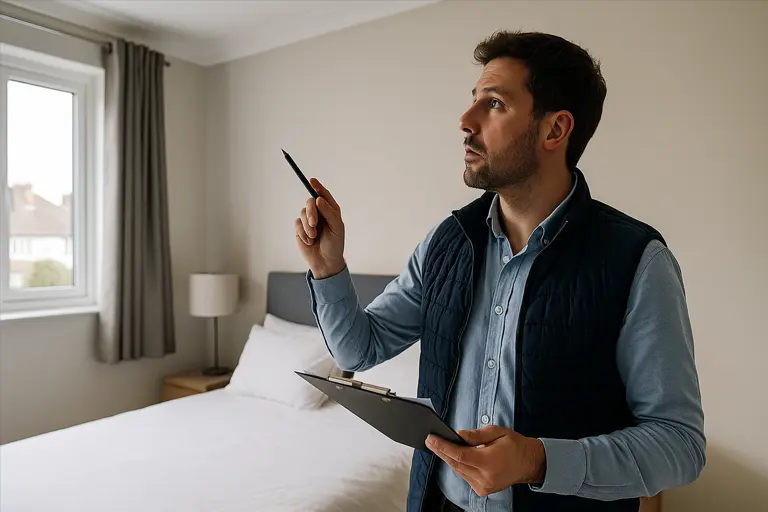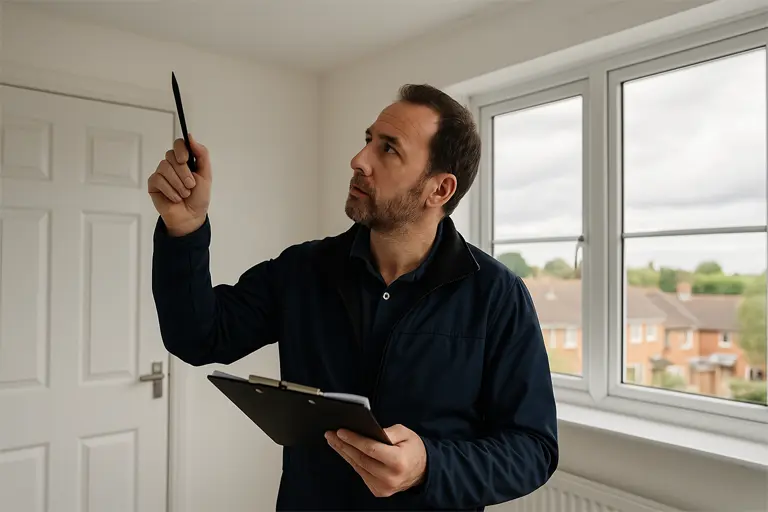When Crime Meets Claims
Discovering that your rental property has been turned into a cannabis farm is more than just a landlord’s worst nightmare, it’s often the beginning of a long, expensive, and frustrating ordeal. Beyond the shock and disgust of seeing a once-normal home ripped apart and turned into a firetrap, many landlords face an even more bitter blow: their insurance won’t cover the damage.
This situation is becoming more common than many landlords realise. As organised crime gangs increasingly target private rentals to grow cannabis, the financial impact on unsuspecting property owners is rising, not just from the repairs but from insurance denials, lost rent, and legal battles.
You might assume that having comprehensive landlord insurance means you’re protected against all types of damage, especially something as serious as this. But that’s not always the case.
Many policies have specific exclusions for illegal activity, and even where cover is technically included, insurers often reject claims due to “landlord negligence”, such as not inspecting the property regularly, missing key warning signs, or failing to vet tenants properly.
In this article, we’ll answer the big question:
Will insurance cover damage caused by a cannabis farm in my rental property?
And just as importantly, we’ll break down:
- What types of damage cannabis farms typically cause
- How most insurance policies handle illegal activity
- The critical role of regular inspections and due diligence
- Practical steps to protect your property and your ability to claim
Because when crime meets claims, it’s the landlords left footing the bill, unless you know how to stay ahead.
To understand why insurers are often reluctant to pay out for cannabis farm-related claims, you first need to understand the scale and severity of the damage these operations cause.
Cannabis cultivation isn’t a hobbyist’s garden project, it’s a high-energy, high-risk industrial setup inside a domestic property. And the aftermath is often devastating.
Here’s what landlords typically find:
🔧 Electrical Tampering and Fire Hazards
Cannabis farms require powerful lighting, heating, and ventilation systems that draw massive amounts of electricity. To avoid detection, criminal tenants often illegally bypass electricity meters, leaving live wires exposed and circuits dangerously overloaded.
This creates extreme fire risk, even after the growers are gone, your property may be unsafe to re-let.
💧 Moisture, Mould, and Structural Damage
Hundreds of plants being watered daily, combined with poor ventilation and high humidity, lead to widespread mould, damp, and even rotting floorboards and ceilings.
Walls are often insulated with makeshift plastic sheeting or foil to trap heat and odour, which can trap moisture and accelerate decay.
🚪 Physical Destruction
Growers often rip out walls, remove insulation, or cut through ceilings to install ducts, vents, and access panels. Rooms are stripped of carpets, light fittings, doors, even bannisters and kitchen units, leaving behind an uninhabitable shell.
🛠️ Hydroponic and Agricultural Waste
Many setups include hydroponic equipment, pots, soil, chemicals, and tubing, all dumped when growers flee. The cleanup can cost thousands, and proper disposal is often required to meet environmental health standards.
💸 Lost Rental Income and Void Periods
Even if damage is repairable, your property could be off the rental market for months, generating no income while still incurring mortgage payments, council tax, and repairs. Some insurers don’t cover loss of rent, especially in cases involving illegal use.
In short: the damage isn’t cosmetic, it’s often structural, electrical, and deeply embedded.
And that’s why insurers scrutinise these claims so carefully.
Common Cannabis Farm Damage and Estimated Costs
| Type of Damage | Typical Impact | Estimated Cost Range |
|---|---|---|
| Electrical Rewiring | Illegal bypass, fire hazard | £2,000 – £6,000 |
| Structural Alterations | Walls removed, loft floors cut | £3,000 – £10,000 |
| Mould and Damp Remediation | Caused by humidity and overwatering | £1,500 – £5,000 |
| Deep Cleaning & Disposal | Soil, hydroponic waste, odours | £800 – £2,500 |
| Lost Rent (Void Periods) | While property is repaired | £1,200 – £5,000+ |
The short answer? It depends.
Many landlords are surprised to learn that standard landlord insurance doesn’t always cover damage caused by illegal activity, and even when it does, payouts often come with strict conditions.
Here’s how most insurers handle it:
🛑 Illegal Activity May Void Your Policy
Some policies include an exclusion clause that automatically invalidates cover if the property is used for illegal purposes, including cannabis cultivation. Even if you weren’t aware of the activity, the insurer might argue that the contract has been breached.
✅ Some Policies Offer Limited Protection
Higher-tier or specialist landlord policies may cover malicious damage or criminal damage by tenants, but often only if you can prove you took all reasonable steps to prevent the crime. That includes regular inspections, written records, and proper tenant referencing.
📆 Inspection Clauses Are Common
Many policies contain clauses requiring inspections to be carried out at least every 3 months. If you can’t show evidence (such as signed reports or timestamped photographs), the insurer may deny the claim on the grounds of negligence.
📋 Due Diligence is Critical
Insurers may investigate your tenant vetting process. If your referencing checks were weak or you didn’t spot red flags (e.g. tenants refusing access or paying in cash), you could be accused of failing to take reasonable precautions.
🏷️ Some Providers Offer Cannabis-Specific Cover
Considering rising cases, some insurers now offer specific add-ons or standalone policies that explicitly cover damage caused by cannabis farms, but these are not standard and typically come at a premium.
The takeaway?
Even with insurance, you must prove that you acted responsibly. If there’s any suggestion you overlooked inspections or failed to manage the property properly, you risk having your claim declined, leaving you to pay for the damage out of your own pocket.

What Do Insurers Look for When You Make a Claim?
When you file an insurance claim after discovering a cannabis farm in your rental property, the insurer won’t just look at the damage, they’ll look at you.
Their goal is to assess whether you took all reasonable steps to prevent illegal activity and mitigate the risk. If they believe you didn’t, they may reduce or even deny your claim.
Here’s what most insurers will want to see:
📆 Documented Inspection Records
You’ll likely be asked to provide proof that you conducted regular property inspections, often every 3 months (or as specified in your policy). This could include:
- Inspection reports with timestamps
- Photographs from each visit
- Notes on tenant interaction or concerns raised
- Confirmation that you followed up on any access refusals
No evidence? Your claim is already in jeopardy.
📝 Tenant Referencing History
Insurers will check how thoroughly you vetted your tenants. You should be able to provide:
- ID and proof of address
- Employer and income references
- Credit and background checks
- Signed tenancy agreements and inventories
If your tenant was a “ghost” with no checks, insurers may argue you were careless.
🚪 Response to Warning Signs
Were there reports of strange smells, blacked-out windows, or excessive condensation? Did neighbours complain or contractors refuse entry? If so, insurers will want to see what you did in response.
Ignoring red flags; or failing to record them, could weaken your case.
📸 Photos of the Property Pre-Tenancy
Images showing the property’s condition before the tenant moved in can help confirm the extent of the damage and prove it wasn’t pre-existing.
📞 Communication Logs with Tenants
Messages or emails where you requested inspections, raised issues, or attempted entry can show that you were being proactive and responsible.
🏢 Use of Professional Agents or Inspectors
If you outsourced inspections to a reputable company, this could work in your favour, especially if they provided professional reports and documentation.
Insurers are not just looking for a reason to pay out, they’re also looking for a reason not to. That’s why documentation, vigilance, and proactive property management are your strongest defence.
What Your Insurer Will Expect to See
| Evidence Required | Purpose | Notes |
|---|---|---|
| Regular Inspection Reports | Shows landlord due diligence | Ideally every 3 months |
| Tenant Referencing Documents | Proves tenant was vetted | Keep ID, credit checks, references |
| Pre-Tenancy Property Photos | Establishes baseline condition | Before move-in |
| Police Case Reference Number | Confirms formal investigation | Strengthens claim validity |
| Communication Logs | Shows attempts to gain access | Emails, texts, notices |
professional Property Inspections
Stay compliant, avoid costly surprises, and protect your property from just £30 + VAT.
Get started with a free consultation today.
How to Strengthen Your Insurance Protection
If you want your insurance to protect you when it matters most, you need to go beyond simply buying a policy, you need to build a solid foundation of due diligence that proves you’re a responsible landlord.
Here are ways to strengthen your position and reduce the risk of claim rejection:
🔍 1. Schedule and Document Regular Inspections
Insurers want to see that you’ve kept a close eye on the property.
- Conduct inspections every 3 months or as per your policy
- Use inspection templates that include photos and condition notes
- Record dates, times, and tenant communications
- Keep signed visit reports or digital logs with timestamps
Tip: Consider using a third-party inspection company, their independent reports often carry more weight in a claim.
👤 2. Vet Tenants Thoroughly
Tenant referencing isn’t just about peace of mind, it’s about evidence.
- Require proof of ID, address, employment, and income
- Conduct credit and criminal background checks
- Use referencing services or certified agents
- Avoid accepting cash-only tenants or bypassing checks to fill voids
Make sure you can prove you’ve done all this, sloppy vetting leaves you exposed.
📄 3. Check Your Policy for Inspection or Illegal Activity Clauses
Every insurer is different, and so are their exclusions.
- Look for any clauses around illegal activity, tenant behaviour, or inspections
- Note if there are timeframes (e.g. must inspect every 90 days)
- Understand the difference between malicious damage, accidental damage, and criminal use
- Speak to your broker or insurer and get clarification in writing if needed
Knowing the small print before an incident can save you thousands.
🏷️ 4. Upgrade Your Cover if Needed
Standard policies might not cut it anymore. Consider:
- Specialist landlord insurance with malicious damage by tenants included
- Policies that explicitly cover cannabis farm damage or loss of rent
- Add-ons for legal expenses or eviction costs
Yes, premiums may be slightly higher but compare that to the cost of an uninsured £40,000 cleanup.
🏘️ 5. Outsource Inspections for Peace of Mind
Letting agents and landlords with large portfolios are increasingly outsourcing property inspections to professional firms.
- Trained staff can spot the subtle signs of criminal activity
- Reports are formatted for legal and insurance use
- Some services even offer white-labelling or digital dashboards
This reduces admin, improves coverage, and ensures you have bulletproof documentation if the worst happens.
By taking these steps now, you’re not just protecting your property, you’re protecting your right to claim.
Policy Cover Comparison – Standard vs Specialist Insurance
| Feature | Standard Policy | Specialist Policy with Cannabis Cover |
|---|---|---|
| Accidental Damage | ✅ | ✅ |
| Malicious Damage by Tenants | ❌ / Optional Add-on | ✅ |
| Illegal Activity Damage | ❌ | ✅ |
| Loss of Rent | Limited / Optional | ✅ (usually included) |
| Inspection Frequency Clause | ✅ | ✅ |
What to Do if You Suspect Your Property Has Been Used as a Cannabis Farm
If you walk into your property and suspect it’s been used for cannabis cultivation, or if neighbours raise concerns, it’s vital you respond calmly, legally, and systematically.
Here’s a step-by-step plan:
🚫 1. Do Not Confront the Tenants
Never attempt to confront, evict, or challenge tenants yourself. Cannabis farms are often controlled by organised crime groups, and tenants may be under duress or willing to use violence.
👉 Your safety comes first.
👮 2. Call the Police Immediately
Contact the police on 101 or 999 (if you suspect danger). Report the potential criminal activity and follow their instructions.
👉 You may be asked to stay away from the property until it’s secured.
📸 3. Document What You Can (From a Distance)
If it’s safe, take external photos or note suspicious details, like boarded windows, tampered meters, strange smells, or ducting.
👉 These could later support your claim or legal action, but do not enter the property.
🏢 4. Notify Your Letting Agent or Property Manager
Inform any third parties responsible for property management. This ensures coordinated action and might provide additional documentation for insurance or legal purposes.
📞 5. Contact Your Insurance Provider Promptly
Let them know what’s happened. They may assign a loss adjuster, request documentation, or send a surveyor.
👉 Delay in reporting can harm your claim, act quickly.
📋 6. Book a Formal Property Inspection After Police Clearance
Once police have cleared the property, book a detailed inspection to assess the damage and document everything. Use a professional service if possible.
👉 Their reports will help with your claim and future risk mitigation.
🧾 7. Begin the Claims Process and Cooperate Fully
Be transparent with your insurer. Provide:
- Copies of the tenancy agreement and references
- Inspection reports
- Police case number
- Photographs and logs
👉 If you’ve done everything right, you’ve got a strong case for a successful claim.
Swift, lawful action paired with proper documentation could mean the difference between a claim being approved or rejected.
Property inspection Service
Stay compliant, avoid costly surprises, and protect your property from just £30 + VAT.
Get started with a free consultation today.
Insurance Is Not a Guarantee — But Preparation Is
Landlords across the UK are facing a new kind of threat: cannabis farms hidden in plain sight within rental properties. These criminal operations don’t just damage homes, they wreck your finances, risk your legal standing, and can leave you holding the bill.
The worst part?
Even if you have insurance, there’s no guarantee you’ll be covered.
Most insurers will comb through your actions as a landlord. They’ll look for gaps in your inspections, weaknesses in your tenant vetting, or vague documentation. If they find any — they may reject your claim entirely.
But this isn’t a hopeless scenario.
Landlords who stay proactive, organised, and informed can protect themselves. By:
- Conducting regular inspections
- Keeping accurate records
- Thoroughly vetting tenants
- Understanding the fine print of your policy
- And taking action, the moment red flags appear
You don’t just protect your property; you protect your right to claim.
Because in the eyes of your insurer, diligence equals credibility.
In a world where crime is getting smarter, so must landlords.
Prepare now, so you’re not paying later.
Frequently Asked Questions About Cannabis & Property Inspections (PIs)
Will my landlord insurance cover cannabis farm damage in a rental property?
Not always. Many standard policies exclude damage caused by illegal activity such as cannabis cultivation. To be covered, landlords often need a specialist policy or proof they took reasonable steps to prevent criminal use.
What should landlords do if they suspect a cannabis farm in their buy-to-let property?
Landlords should never confront tenants. Instead, contact the police immediately, document what you safely can, inform your letting agent, and begin the claims and inspection process once the property is secure.
Can I claim for lost rental income due to cannabis farm damage?
Some landlord insurance policies cover loss of rent, but only if criminal damage is also covered. Always check your policy’s small print and exclusions related to illegal activity.
How often should I inspect my rental property to stay compliant with insurance?
Every 3 months is standard. Many insurers require quarterly inspections to maintain coverage. Skipping inspections can void your ability to claim for cannabis farm-related damage.
Is damage from tenant cannabis cultivation considered malicious or criminal damage?
It depends on your policy wording. Some insurers treat it as malicious damage by tenants (potentially covered), while others exclude it as illegal use of the property.
What tenant red flags could indicate illegal cannabis cultivation in my property?
Signs include tenants refusing inspections, paying in cash, installing blacked-out windows, strong odours, condensation, or unusually high utility usage.
How can landlords legally protect themselves against cannabis farms?
Conduct thorough tenant referencing, carry out regular inspections, keep records, understand your policy exclusions, and consider outsourcing inspections to professionals.
Do all landlord insurance policies exclude cannabis farm damage?
No, but many do. Some specialist landlord insurers now offer cover that includes malicious or criminal damage caused by cannabis cultivation. Always read policy details carefully.
What kind of repairs are needed after a cannabis farm is removed from a property?
Common repairs include rewiring electrical systems, replacing insulation, treating mould, fixing structural damage, and deep cleaning to remove odours and contamination.
Are landlords legally responsible if their tenant runs a cannabis farm?
Landlords may not be criminally liable, but they can still face serious consequences — including rejected insurance claims, costly repairs, and local authority investigations if due diligence wasn’t followed.
How do cannabis farms affect a property’s future rental potential?
Properties previously used for cannabis cultivation may be harder to let due to lingering odours, damage, or stigma. Insurance premiums may also increase.
What is the best way to prove I conducted regular property inspections?
Use professional inspection reports with timestamps, photographic evidence, signed tenant acknowledgements, and consistent communication logs with your tenants.
Do letting agents offer cannabis farm inspections for landlords?
Some do, but not all letting agents inspect for illegal activity thoroughly. Consider using a dedicated inspection company that specialises in identifying high-risk tenancy behaviours.
Can landlords be prosecuted if they fail to spot a cannabis farm?
While rare, landlords could face investigation if there’s evidence they turned a blind eye. More commonly, failure to act can lead to civil liabilities or invalidated insurance claims.
Should I outsource property inspections to prevent insurance claim issues?
Yes, outsourcing to trained professionals ensures high-quality documentation, early issue detection, and stronger insurance claim evidence should something go wrong.



